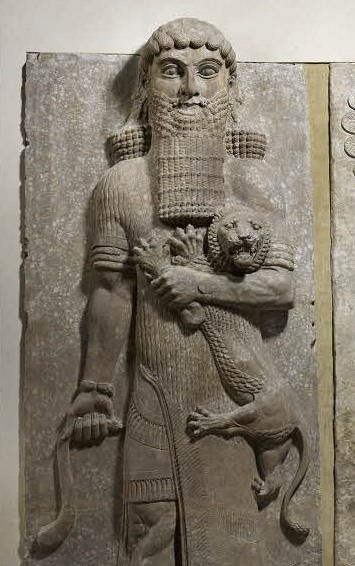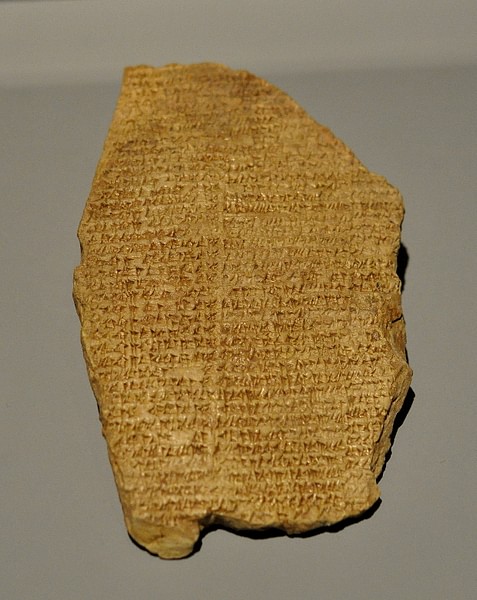Gift of Life That Makes Old Men Young Again Giglamesh
The Epic of Gilgamesh is among the most pop works of literature in the present day and has influenced countless numbers of readers merely, for the greater part of its history, information technology was lost. The Assyrian Empire cruel to a coalition of Babylonians and Medes in 612 BCE who sacked and burned the Assyrian cities and, amid them, Nineveh.
Nineveh was the great capital where the king Ashurbanipal (668-627 BCE) had established his library which housed copies of every literary work he could discover throughout Mesopotamia. Equally these works were written in cuneiform on clay tablets, however, the fires which consumed the library did nothing to the tablets but to bake them. Withal, the buildings which housed these works were destroyed, burying the literature of Mesopotamia beneath them for over 2,000 years until they were re-discovered in the mid-19th century CE.

Inundation Tablet of the Epic of Gilgamesh
At this fourth dimension, European antiquarian societies, museums, governments, and other institutions sent archaeologists to Mesopotamia in the interest of finding physical evidence which would corroborate narratives in the Bible. Since Mesopotamian sites and kings were so ofttimes mentioned throughout the Old Testament, it was idea that a concerted attempt in excavation would show the narratives true. This was specially important at this time as Darwin'south work had been gaining in popularity since its publication in 1859 CE and people were questioning the say-so of the Bible.
The Mesopotamian excavations of the 19th century CE literally changed world history because now it was understood that the Bible was not the oldest volume in the world.
What these excavators discovered was actually the verbal contrary of what they were sent to discover. Equally they uncovered the cities of Mesopotamia, they too uncovered the ancient texts which, one time deciphered, clearly showed that some of the most famous stories in the Bible - the Fall of Man, the Smashing Overflowing and Noah's Ark - were later on versions of Sumerian myths and legends.
The Mesopotamian excavations of the 19th century CE literally changed world history because now it was understood that the Bible was not the oldest book in the globe, that civilizations had flourished for thousands of years before the biblical date of the creation of the earth, and these civilizations had actually created many of the technologies, innovations, belief structures, and literary genres which had been ascribed to later on peoples.
Amidst these genres was the heroic epic - long thought to have been created by Homer in Greece (c.8th century BCE) - just now understood to have been a Mesopotamian innovation. The Epic of Gilgamesh was discovered by the modern world in 1849 CE past the English explorer and archaeologist Austen Henry Layard. The fullest surviving version, in the Akkadian language, was found on twelve stone tablets in the ruins of the ancient library of Ashurbanipal.

Function of Tablet 5, the Epic of Gilgamesh
The starting time xi tablets relate the standard version of the ballsy while the 12th tablet narrates an older Sumerian verse form Bilgames and the Netherworld. Bilgames is another version of the name Gilgamesh but, as this tablet contradicts the story told in the first eleven, it is non included in most standard versions of the tale. Fifty-fifty so, with or without the twelfth tablet, the Epic of Gilgamesh is a stunning literary achievement which remains a best-seller thousands of years later it was written and confers upon its hero that which he sought throughout his story: immortality.
Origins of the Story
The Epic of Gilgamesh was originally a Sumerian poem, afterwards translated into Akkadian, and kickoff written downwardly some 700 – grand years after the reign of the historical king of Uruk upon whom it is based. The poem was known originally equally Sha-naqba-imru (He Who Saw The Deep) or, alternately, Shutur-eli-sham (Surpassing All Other Kings). The character was already developed in earlier Sumerian works as a great hero and demi-god, brother of the goddess Inanna, and a mighty warrior but, in the epic, he is transformed into the embodiment of the human struggle confronting death, loss, and the credible meaningless of existence.
The writer of the epic is Shin-Leqi-Unninni (whose name translates as `Moon god, have my plea') a Babylonian scribe who wrote c. 1300-m BCE and has been cited as the first writer of literature in the western world even though that honor is rightly accorded to Enheduanna, daughter of Sargon of Akkad, who lived 2285-2250 BCE. Orientalist Samuel Noah Kramer points out that Shin-Leqi-Unninni did far more than only translate and copy an earlier Sumerian work, he created something wholly new from older sources and this "something new" was the heroic epic (History Begins at Sumer, 270). According to the scholar North.G. Sandars, the piece of work is "the finest surviving epic poem from any menstruation until the appearance of Homer's Iliad; and information technology is immeasurably older"(Sandars, 7).
The hero of The Epic of Gilgamesh is the one-half-legendary King of Uruk who, according to the poem, felled the neat trees of the Cedar Forest with his friend Enkidu to build the mighty gates of the city and journeyed far to detect the clandestine of eternal life from the seer Utanapishtim. It is generally accustomed that Gilgamesh was the historical 5th rex who ruled in Uruk, widely regarded every bit the birthplace of writing in the west, circa 2500 BCE.

Hero Overpowering a Panthera leo
Archaeological finds of letters and inscriptions attesting to his deeds, and those of his son, provide no reason to doubt such a man existed. In 2003 CE, in fact, a squad of archaeologists claimed to take institute Gilgamesh's tomb in the old riverbed of the Euphrates.
The deeds of this rex were and then great that, in time, the man was transformed from a mere mortal to a god. His father is said to take been the Priest-King Lugalbanda and his mother was the goddess Ninsun (besides known every bit Rimat-Ninsun Ninsumun, the Holy Mother and Great Queen, whose proper name is interpreted as `Baronial Cow' or `Wild Cow of the Enclosure') thus making Gilgamesh a demi-god of extraordinary endurance and force simply, also, mortal.
While Gilgamesh could, and did, perform many slap-up feats, he could not finally realize his greatest desire to conquer decease, to live eternally – or could he?
The Quest for Eternal Life
The wild man Enkidu who would be a challenge to Gilgamesh'south strength &, perhaps, teach him humility.
According to The Epic of Gilgamesh, the dandy male monarch, arrogant and cruel amid the lesser beings he ruled, was sent a strange gift from the gods: the wild homo Enkidu who would exist a challenge to Gilgamesh's strength and, maybe, teach him humility.
Enkidu, originally without law and running wild in the forests, is seduced and thereby tamed by the temple harlot Shamhat, and is brought to Uruk where he, as intended, challenges Gilgamesh. Afterward they fight, and Enkidu is bested, the ii vow eternal friendship to each other and Gilgamesh'due south mother Ninsun adopts Enkidu as her ain.
Following the boxing of the Cedar Wood in which they defeat the demon Humbaba the terrible and, soon after, the Balderdash of Heaven (insulting the goddess Inanna-Ishtar along the way) the gods decree the expiry of Enkidu, claiming that someone must pay the blood cost for such presumptuous deeds. Enkidu dies and, in that moment, Gilgamesh realizes that he, too, will die and this cognition torments him.
He cries out:
How tin I residuum, how can I be at peace? Despair is in my eye. What my brother is now, that shall I be when I am dead. Considering I am agape of expiry I volition get equally best I tin can to find Utnapishtim whom they phone call the Faraway, for he has entered the associates of the gods. (Sandars, 97)

The Story of Gilgamesh & Aga
Later on a journey across the State of Dark and the Waters of Death, Gilgamesh finds the ancient man Utanapishtim, the but human being to survive the Peachy Flood who was, after, granted immortality. Utanapishtim tells Gilgamesh the story of how he was warned past the god Ea of the coming deluge, followed his command to build an ark and identify assorted animals inside and and so save himself and his family unit from decease and humanity from extinction.
He then tells Gilgamesh eternal life will be granted if the great king can stay awake for the side by side half-dozen days. Gilgamesh fails in this and fails in his adjacent endeavor (to bring back a magic plant which will brand i young again. The plant is eaten by a snake while Gilgamesh sleeps; thus explaining why snakes shed their skins) and, having failed to win immortality, is brought back to Uruk by the ferryman Urshanabi where, once home, he writes downwards his great adventure.
According to the historian D. Brendan Nagle:
This magnificent poem, which deals with such eternal human issues as sickness, old age, expiry, fame and the peckish for the unattainable, can be considered a metaphor for Mesopotamia's own heroic struggle to resist decay and leave a name for itself amongst the peoples of Earth. (16)
However true that may be, the epic is, at heart, the eternal struggle of the individual to find pregnant in being. Sandars writes:
If Gilgamesh is not the first human hero, he is the first tragic hero of whom anything is known. He is at once the most sympathetic to us, and near typical of private man in his search for life and agreement. (7)
While Gilgamesh may have failed in his quest for immortality in the epic and the historical king is known just through passing references, lists and inscriptions, he lives on eternally through the work of Shin-Leqi-Unninni and the many other, now nameless, scribes who wrote downward the orally transmitted tale and translated the story laboriously generation to generation.
These scribes attribute the original source of the story to Gilgamesh himself who, allegedly, inscribed his cracking deeds and adventures on a huge stone past the gates of Uruk. In the words of the anthropologist Gwendolyn Leick, Gilgamesh thus "became immortal by making a meaning contribution to the greatness of his metropolis by availing himself of the city's ultimate cultural invention: writing" (56).
Through the written discussion, the story of Gilgamesh and his pride, his grief for the loss of his loved friend, his fear of death and quest for eternal life, the bang-up king does, in fact, conquer death and wins his immortality each time his tale is read.
This article has been reviewed for accurateness, reliability and adherence to bookish standards prior to publication.
Source: https://www.worldhistory.org/article/192/the-eternal-life-of-gilgamesh/
0 Response to "Gift of Life That Makes Old Men Young Again Giglamesh"
Postar um comentário